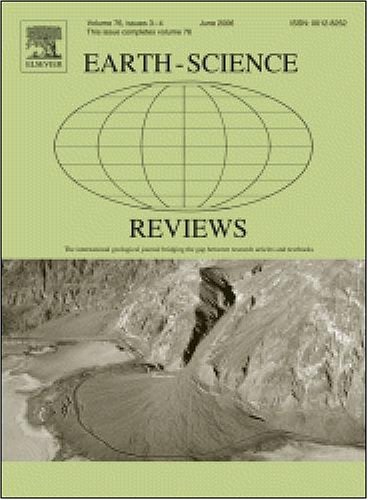测井仪预测总有机碳:全面回顾
IF 10.8
1区 地球科学
Q1 GEOSCIENCES, MULTIDISCIPLINARY
引用次数: 0
摘要
源岩是石油系统的基本要素,而总有机碳(TOC)是源岩性质评价中最重要的地球化学参数之一。实验室测试的 TOC 测定方法既昂贵又有限,因此利用地球物理测井记录预测 TOC 对源岩特征描述至关重要。虽然目前已经提出了多种 TOC 定量方法,但由于 TOC 与测井资料之间存在复杂的非线性关系,以及各种 TOC 预测方法的固有局限性,使用测井资料对 TOC 进行划分和定量仍然存在很大的不确定性。为了填补 TOC 与测井记录之间的空白,消除经验方法(如 ΔlgR 方法)中存在的不确定性,需要对地质、地球物理和地球化学数据进行整合。回顾了使用测井仪评价源岩的历史,并选择了源岩的敏感测井仪参数。将 TOC 含量与测井系列相关联,以揭示源岩层段的测井反应。富含有机质的岩层段具有较高的铀(U)浓度和伽马射线(GR)读数、较高的声波穿越时间(AC)和补偿中子测井(CNL)、较高的电阻率,但密度读数较低。然后,从原理、解释过程、优势和局限性等方面总结了用于 TOC 定量的各种方法。Schmoker 方法不适用于页岩,钻孔的规则性会影响 TOC 与体积密度之间的线性回归关系。Passey的ΔlgR方法应用广泛,但基线选择会降低精度,且ΔlgR方法不适用于高成熟度或深埋源岩。多元回归分析法很难在其他源岩中推广。光谱 GR 法很难用于湖泊源岩分析。核磁共振(NMR)和光谱矿物成分测井(斯伦贝谢公司的 Litho-Scanner 测井)的采集成本较高,限制了其在源岩评价中的应用。反向传播(BP)神经网络、极端梯度提升(XGBOOST)等人工智能方法可用于通过常规测井预测 TOC 含量,并将结果与地球化学测量的 TOC 和 ΔlgR 方法进行比较。各种 TOC 预测方法的优化应充分考虑其优势和局限性。此外,源岩的综合评估应确定源岩的总有机碳、质量和成熟度。本综述为测井仪在源岩评价中的应用提供了系统而新颖的见解,有望填补地质学家、地球化学家和岩石物理学家之间的空白。本文章由计算机程序翻译,如有差异,请以英文原文为准。
Well log prediction of total organic carbon: A comprehensive review
Source rocks are fundamental elements for petroleum systems, and Total Organic Carbon (TOC) is one of the most important geochemical parameters in source rock property evaluation. The TOC determination methods using laboratory tests are expensive and limited, therefore prediction of TOC using geophysical well logs are vital for source rock characterization. Though there are various proposed TOC quantitation method, however, there still remains large uncertainty in delineation and quantitation of TOC using well log data due to the complex non-linear relationships between TOC and well log information, as well as the inherent limitations of various methods for TOC prediction. To fill the gaps between TOC and well logs, and eliminate uncertainties existing in empirical methods such as ΔlgR method, the geological, geophysical and geochemical data are integrated. History of source rock evaluation using well logs is reviewed, and sensitive well log parameters for source rocks are selected. The TOC content is correlated with well log series to unravel the well log responses of source rock intervals, and the organic matter rich intervals have high Uranium (U) concentrations and gamma ray (GR) readings, high sonic transit time (AC) and compensated neutron log (CNL), high resistivity, but low density readings. Then the various methods used for TOC quantitation are summarized in terms of their principles, interpretation process, and advantage and limitations. The Schmoker method is not applicable in shales, and borehole regularity will affect the linear regression relationship between TOC and bulk density. The Passey's ΔlgR method is widely used, however, the baseline selection will reduce the accuracy, and ΔlgR method is not applicable in highly mature or deep burial source rocks. The multiple regression analysis is hard to extend in other source rocks. The spectral GR method can hardly be used for lacustrine source rock analysis. The high acquisition costs of Nuclear Magnetic Resonance (NMR) and spectral mineral composition log (Schlumberger's Litho-Scanner logs) limit their extension in source rock evaluation. Artificial intelligence methods such as Back propagation (BP) neural network, Extreme Gradient Boosting (XGBOOST) can be used to predict TOC content via conventional logs, and the results are compared with the geochemical-measured TOC and ΔlgR method. The optimization of various methods for TOC prediction should fully consider their advantage and limitations. Additionally, comprehensive assessment of source rock should determine TOC, quality, and maturity of source rocks. This comprehensive review provides systematic and novel insights in applications of well logs in source rock evaluation, and has potential to fill gaps between geologists, geochemists and petrophysicists.
求助全文
通过发布文献求助,成功后即可免费获取论文全文。
去求助
来源期刊

Earth-Science Reviews
地学-地球科学综合
CiteScore
21.70
自引率
5.80%
发文量
294
审稿时长
15.1 weeks
期刊介绍:
Covering a much wider field than the usual specialist journals, Earth Science Reviews publishes review articles dealing with all aspects of Earth Sciences, and is an important vehicle for allowing readers to see their particular interest related to the Earth Sciences as a whole.
 求助内容:
求助内容: 应助结果提醒方式:
应助结果提醒方式:


